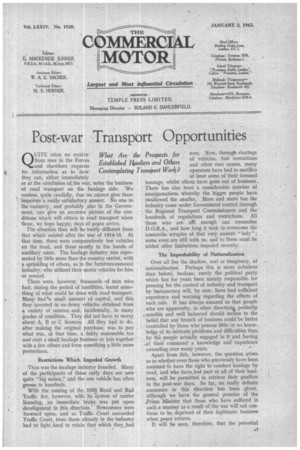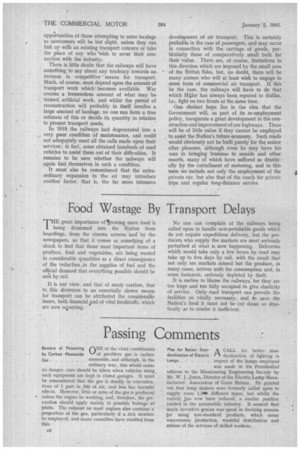Post-war Transport Opportunities
Page 9

Page 10

If you've noticed an error in this article please click here to report it so we can fix it.
QCITE often we receive from men in the Forces and elsewhere requests 4 for information as to how they can, either immediately or at the conclusion of the war, enter the business of road transport on the haulage side. We confess, quite candidly, that we cannot give these inquirers a really satisfactory answer. No one in the iindustry, and probably ,also in the Government, can give an accurate picture of the conditions which will obtain in road transport when those, we hope happy, day of peace arrive. The situation then will be vastly different from that which existed after the war of 1914-18. At that time, there were comparatively few vehicles on the road, and these mostly in the hands of ancillary users. The haulage industry was rePresented by little more than the country carrier, with a sprinkling of others, as in the furniture-removal industry, who utilized their motor vehicles for hire or reward.
There were, however, thousands of men who had, during the period of hostilities, learnt something of what could be done with road transport. Many had la small amount of capital, and this They invested in ex-Army vehicles obtained from a variety of sources. and, incidentally, in many grades of condition. They did not have to worry about A, B or C licences. All they had to do, after making the original purchase, was to pay what was, at that time, a fairly reasonable tax and start a small haulage business or join together with a_few others and form something a little more pretentious.
• Restrictions Which Impeded Growth Thus was the haulage industry founded. -Many of the participants of those early days are now quite "big noises,:' and the one vehicle has often grown to hundreds.
With the coming of the 1933 Road and Rail Traffic Act, however, with its system of carrier licensing, an immediate brake was put upon development in this direction. Newcomers were frowned upon, and as Traffic Court succeeded Traffic Court, 'even those already in the industry had to fight hard to retain that which they.had won. Now, through shortage of vehicles, fuel restrictions and other root causes, many operators have had to sacrifice at least some of their licensed tonnage, whilst others have gone out of business., There has also been a considerable number of amalgamations whereby the bigger people have swallowed the smaller, More and more has the industry come under Government control through the Regional Transport Commissioners and the hundreds of regulations and restrictions. All ' those who arb on enough can remember D.O.R.A., and how long it took ta overcome the numerous scruples of that very austere "lady"; some even ,are still with us, and to them must be added other limitations imposed recently.
The Improbability of Nationalization Over all lies the shadow, real or imaginary, of nationalization. Perhaps this is more nebulous than before, because, surely the political party which has for years been mainly responsible for pressing for the control of industry and transport by bureaucracy will, by now, have had sufficient experience and warning regarding the effects of such rule. It has always amazed us that people who are apparently, in other directioni„ perfectly sensible and well balanced should incline to the belief that any branch of business could be better controlled by those who possess little or no knowledge of its intricate problems and difficulties than by the people actually engaged in it and having .at their command a knowledge and experience extending over many years.
Apart from this, however, the question arises as to whether even those who previously have been assumed to have the right to conduct haulage by road, and who have, lost part or all of their business, will be permitted to retrieve their position in the post-war days. So far, no really definite assurance in this direction has been given, although we have the general promise of the .Prime Minister that those who have suffered in such .a mariner as a result of the war will not continue to be deprived of their legitimate business when peace returns. It will be seen, therefore, that the potential opportunities of those attempting to enter haulage as newcomers will be but slight, unless they can link up with an existing transport concern or take the place of any who 'wish to sever their connection with the industry.
There is little doubt that the railways will have something to say about any tendency towards an increase in competitive means for transport. Much, of course, must depend upon the amount of transport work whichbecomes available. War creates a tremendous amount of what may be ' termed artificial work, and whilst the period of reconstruction will probably in itself involire a large amount of haulage, no one ean form a true estimate of this or decide its quantity in relation to present transport needs.
In 1919 the railways had degenerated into a very poor condition of maintenance, and could not adequately meet all the calls made upon their services; in fact, some obtained hundreds of used vehicles to assist them out of their difficulties. It remains to be seen whether the railways will again find .themselves in such a condition.
It must also be remembered that the extraordinary expansion in the air may introduce another factor, that is, the far more intensive development of air transport. This is certainly probable in the case of passengers, and may occur in connection with the carriage of goods, particularly those of comparatively small bulk for their value. . There are, of course, limitations in this direction which are imposed by the small area of the British -Isles, but, no doubt, there will be many airmen who will at least wish to engage in some form of commercial air transport. If this be the case, the railways will have to do that which Hitler has always been reputed to dislike, i.e., fight on two fronts at the same time.
One distinct hope lies in the idea that the Government will, as part of its re-employment policy, inaugurate a great development in the construction and improvement of our highways. These • will be of little value if they cannot be employed to assist the Nation's future economy. Such roads would obviously not be built purely for the seeker after pleasure, although even he may have his uses in bringing business to seaside and other resorts, many of which have suffered so drastically by the curtailment of motoring, and in this term we include not only the employment of the private car, but also that of the coach for private trips and regular long-distance service












































